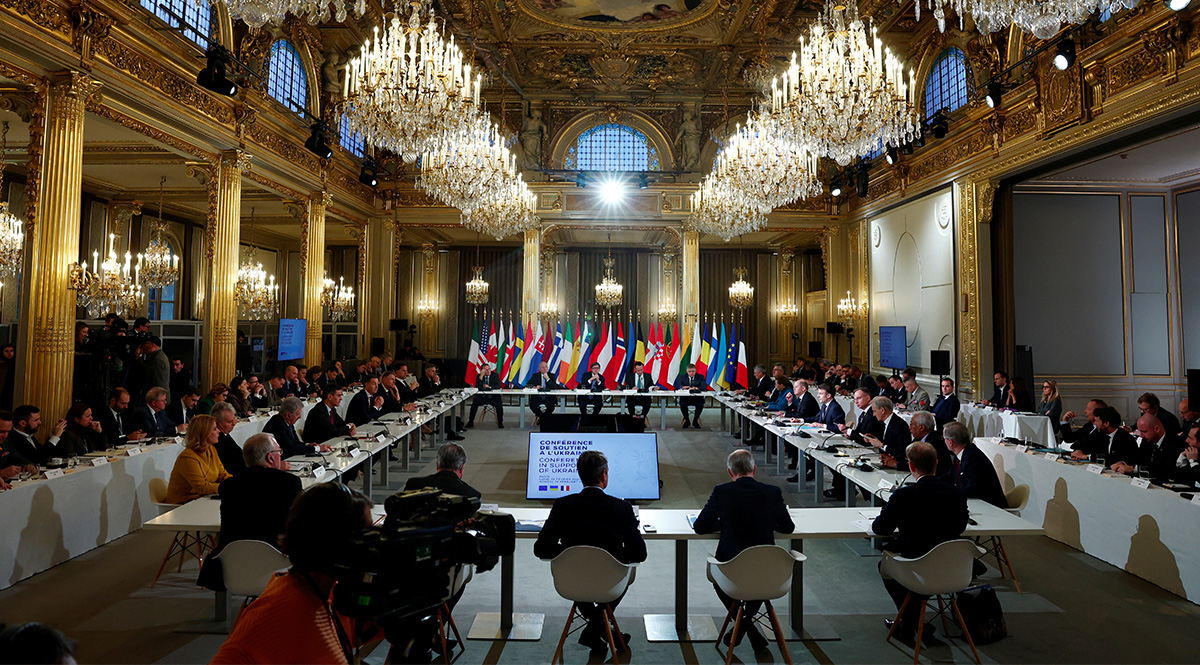Western Leaders Demonstrate Ukraine Support at Paris Conference
As Russia regained the initiative on several sections of the front lines two years after the start of the full-scale war, a conference on support for Ukraine was held in Paris. At France’s initiative, representatives of Western countries discussed further coordination of activities to increase military support, and a specific plan for the transfer of ammunition is to be presented within 10 days.
 GONZALO FUENTES / Reuters / Forum
GONZALO FUENTES / Reuters / Forum
What was the purpose of the conference in Paris and who took part in it?
Twenty-seven leaders took part in the conference, mainly presidents and heads of government of EU countries, but also representatives of the governments of the U.S., Canada, and the UK. Poland was represented by President Andrzej Duda. The aim of the meeting was to demonstrate the determination of Western countries to maintain and increase support for Ukraine in the military and financial dimensions and to send a clear signal to Russia, as well as to other countries directly or indirectly supporting Vladimir Putin’s regime, that there is no war fatigue in the pro-Ukrainian coalition. The leaders gathered in Paris were there to show the unity of the main European countries regarding Ukraine, which was particularly important given the political crisis in the U.S. and the uncertainty of American policy after the November presidential and congressional elections. President Volodymyr Zelensky addressed the meeting participants remotely, emphasising that so far only 30% of the missile deliveries declared by the EU have been completed.
Why did France take the initiative to organise the meeting and what are its goals?
In recent months, France has sharply toughened its tone towards Russia, trying to move away from its ineffective role as a mediator between Russia and Ukraine and take the lead in gathering international support for President Zelensky and providing military equipment and ammunition. After a series of ambiguous declarations from France towards Russia in the first year after the full-scale invasion (such as emphasising the need not to humiliate Russia or considering future security guarantees for this country), President Macron is trying to build his position as Ukraine’s main European ally, as evidenced by, among others, signing a bilateral security agreement with Ukraine as one of the first countries. In the face of France’s weak involvement in the supply of military equipment, criticised by allies and public opinion, President Macron wants to demonstrate that France is ready to increase its efforts to help Ukraine. The conference was held in the context of the lack of agreement between the Biden administration and Republicans in Congress on the adoption of another U.S. aid package for Ukraine worth $60 billion and concerns about future support from the United States, which is the largest donor of military aid. Macron is emphasising his leadership role in the EU and the ability assume the of the United States in the context of the aid crisis in Congress. He is offering to take the lead on Ukraine's accession to the EU and NATO, and in a broader perspective, accelerate European integration, push for the French concept of financing the European defence sector and increasing its production capacity, strengthen the EU’s security and defence policy in line with its strategic vision, and raise Europe’s position as an independent actor in the context of global challenges. For Macron, the leaders meeting was also an opportunity to show how Europe can build its strategic sovereignty.
Why does Ukraine need more assistance now?
The beginning of the third year of the Russian full-scale war against Ukraine presents many challenges. The future of Ukraine’s continued defence largely depends on whether the country’s partners can effectively increase their defence production and will decide to transfer more weapons, especially long-range types. The failed counter-offensive of 2023 demonstrated the need for comprehensive military support rather than donations of small batches of various types of equipment. At the same time, Russia has been conducting increased disinformation activities targeting Western societies, aimed at creating a sense of “war fatigue” in and concerning Ukraine and, which together with its “peace propaganda” is hoped to translate into reduced support for the besieged country. However, in addition to the bilateral security agreements signed this year, the Paris conference is a further sign that partner states are prepared to maintain military aid to Ukraine in 2024. It is also a signal to Ukrainian society, which faces a weakening of the previously high morale and lack of mobilisation resulting from the prolonged conflict.
What are the results of the conference?
The conference demonstrated Western countries’ unity and willingness to assist Ukraine. Concrete results include an agreement to increase the supply of munitions. In addition to working on increasing production capacity in the EU, some 15 countries intend to join the Czech initiative to purchase ammunition for Ukraine with EU funds from third countries, mainly Korea, Turkey, and South Africa. Initially reluctant to support the plan, France signalled a change of position. In addition, President Macron announced the formation of a coalition of countries led by France to provide Ukraine with long-range missiles. The leaders gathered in Paris agreed on five areas for new initiatives. These include increasing cyberdefence capabilities, developing the co-production of military equipment and ammunition in Ukraine, strengthening the defence of countries directly threatened by Russian aggression in Ukraine (in particular Moldova), supporting Ukraine on the border with Belarus with non-military means, and de-mining operations in Ukraine. Poland emphasised, in particular, the need to increase the supply of ammunition.
Will Western troops be deployed to Ukraine?
The possible deployment of military units from European countries to Ukraine also emerged in the discussion. However, it is not clear what role that could play in supporting the Ukrainian Armed Forces at the tactical level or in terms of border protection. The suggestion that such action has not been ruled out was a significant signal from President Macron. It reaffirmed France’s ambition to play a greater role in supporting Ukraine and the future political process to end the conflict. However, other countries excluded this possibility, suggesting that on this issue the conference participants are sharply divided and that it will be a significant point of contention in the future. However, the very fact that talks are taking place on this topic sends a strong signal to Russia about the potential consequences of continuing its aggression against Ukraine.






